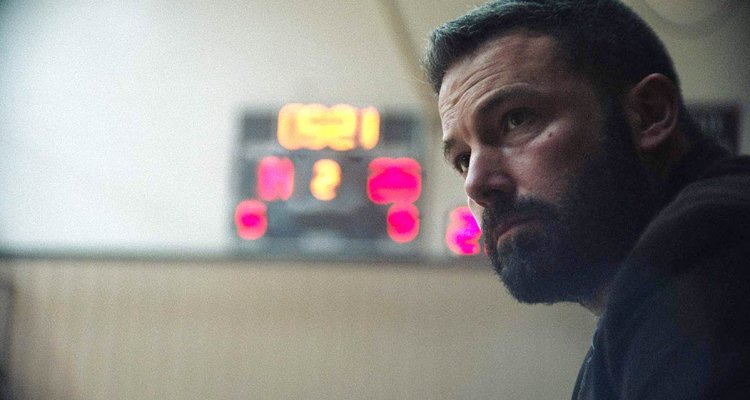Movies and basketball aren’t all that different. Both need a competent coach (director), competitive players (actors) and capital funding (producers) to succeed. In other words: teamwork makes the dream work. In Ben Affleck’s “The Way Back,” all of this necessary synergy coalesces to create an indelibly inspiring comeback story for the actor and his leading character.
READ MORE: 100 Most Anticipated Films Of 2020
The actor and his character, it turns out, aren’t dissimilar. Considering that this a self-reflexive film in the style of say, Shia Labeouf‘s painfully personal and emotionally vulnerable “Honey Boy,” it’s clear that Affleck made “The Way Back” as a sort of personal therapy. He knows there are no excuses for his actions; no defense for his drinking problem that seems excessive even by Boston standards. But he also knows that by coming clean he can inspire millions of people, which it will. Thanks to filmmaker Gavin O’ Connor’s unflinching direction and Affleck’s unsparingly honest performance (their second collaboration after “The Accountant“), you will cheer from the bleachers for this high school basketball coach, even if it means biting back the tears.
READ MORE: The 100 Best Films Of The Decade [2010s]
Jack Cunningham (Affleck) doesn’t start the film coaching basketball. Instead, the former high school basketball phenom who wasn’t able to punch that ticket to college ball is a construction worker who can’t seem to rebuild his crumbling life. Which isn’t all his fault. Since his son died and his wife cheated on him, there’s a good reason for him to crack a cold one in the shower from time to time. But Jack drinks as if it were a full-time job, and his growing beard and beer belly have the people of San Pedro worried.
Eventually, and reluctantly, he is convinced back into the game through coaching, via a worried friend, trying to kill two birds with one stone—help his ailing team and help his ailing, alcoholic friend. But it’s a tough road, and basketball has all sorts of triggers to past demons. Audiences needn’t worry too much, though. We know O’Connor is kicking Jack, testing his spirit and resolves while he’s down so that his comeback is all the more resounding.
READ MORE: The Best Performances Of The Decade [2010s]
Occasionally O’Connor’s direction is too downer-y and overwrought for its own good, especially in the beginning. How many medium shots of Jack downing shots at a bar can one stomach? Things eventually do sober up, however, when Jack gets that call to coach his alma mater’s basketball team. It’s a fresh start, and it couldn’t come at a more clutch time for Jack and the movie.
READ MORE: The 25 Best Films Of 2019
And “The Way Back” starts to feel more engaging as Jack opens up. On the basketball court, Affleck showcases a temper and sense of humor sorely lacking in the first act. “You wonder why they keep leaving you open?” he asks his center. “Because they don’t think you can hit the ocean from the beach.” Jack isn’t lying. Every sports fan knows that undersized teams like this one (or the small-ball Houston Rockets), have to make up for their lack of height with shooting, chemistry, and scrappy intensity. All of which this team lacks. Which gives Jack a heroic uphill climb that rivals Gene Hackman‘s coach ascent in “Hoosiers” but converting the wins into something much more deeply personal.
READ MORE: The Way Back’ Trailer: Ben Affleck Seek Redemption In New Sports & Road To Recovery Drama
As Jack inspires and the team starts winning games, in nail-biting endings, the camera cuts to multiple angles of players attacking the basket to create the illusion that we are on the court with them. One game winner is especially gripping in shape, creating an emotional crescendo so crucial to Jack’s journey bumpy road to redemption. As Jack draws up a play for his point guard, Brandon (Brandon Wilson), O’Connor skillfully crafts a stressfully visceral pressure. The crowd roars in the background. Brandon dribbles off a hedge screen, then releases the ball in slow motion: 3…2…1… swish! The crowd erupts. Jack lets out a sigh of relief.
And there’s a reason the movie cuts to Jack’s crucial moment of release and not the cheering players or crowd. It’s Jack’s movie. His story and his wins off the court are more meaningful than the ones on (which is why the third act has not even one game in it). O’Conner’s poignant conclusion cleverly suggests that it’s the small victories that help us overcome life’s biggest obstacles. And Affleck gives the character a soulful, resilient spirit that could have only come from someone who has lived through the pain. His suffering becomes universal; his victories become ours.
A movie about deep regrets, taking them head-on, forgiving oneself and more, “The Way Back,” on paper, has so much potential for clichés about demons in a bottle. Instead, and triumphantly earned, this affecting path to redemption is a piercing portrait of man and actor who, when the clock’s winding down, can drain the shot that matters most. [B+]

